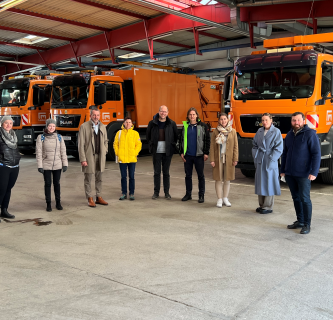KOFIX
Municipal fleet mix

The switch from fossil fuels to sustainable alternatives has arrived in the private sector. Commercial vehicles are a different story. We are currently addressing the challenges of the modernization of municipal road vehicles in our KOFIX project.
Many cities and municipalities are striving to convert their vehicle fleets to alternative drive technologies. In addition to sustainability considerations, this is also due to the new Road Vehicle Procurement Act - SFBG, which requires a minimum quota in the procurement of clean commercial vehicles. However, they face some challenges in choosing suitable vehicles. On the one hand, the selection of available vehicles with alternative drives is still very limited, and on the other hand, there is as yet hardly any experience regarding the efficiency and effectiveness of such vehicles. Manufacturers' specifications regarding range are often too general and cannot be applied one-to-one to individual requirements and the varying conditions in a city or community. Therefore, these manufacturer specifications are often insufficient for the evaluation within a procurement process.
For this reason, KOFIX addresses the deficits in the procurement process and, together with the municipality of Leoben, Triagonal and ECUSTODIA , develops transferable bases for decision-making at the component level. For this purpose, operating data, vehicle data and environmental data are analyzed in combination and energy profiles are created for different vehicle classes depending on influences such as topography, purpose of use and seasons.
As part of her master-thesis "Ways to decarbonize the municipal vehicle fleet", Master's student Daniela Steiner was able to deal with the questions of which vehicles are suitable for converting to alternative drive technologies, whether they are available and how their energy requirements could be covered sustainably.
Project-goals:
The goal is to calculate the energy supply, the environmental impact and the costs or benefits in general and the specific calculation for the location Leoben. The energy profiles will be made available as open source. Thus, future vehicle developments can be optimized to the actual demand and the procurement process can be improved sustainably.
The project results lead to higher CO2 savings potentials, improve the availability of the infrastructure and support the achievement of sustainability goals.
You can learn more about sustainable mobility and urban development in our Energy, Mobility and Environmental Management and Mobility Technologies degree programs.





